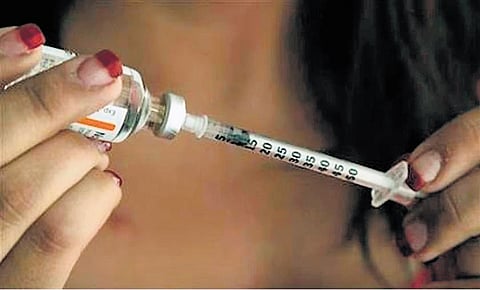

THIRUVANANTHAPURAM: Nearly 2,000 children with Type 1 Diabetes (T1D) from low-income families have been struggling since June 1, following a change in the insulin regimen under the Mittayi Project run by the Social Security Mission. The switch from rapid-acting to slow-acting insulin has caused delays in meals, poor blood sugar control, and serious health complications-especially for school-going children.
Children now have to wait up to an hour after their insulin shot before eating, disrupting school routines and often leaving them hungry and distressed. “The wait gets longer because blood sugar has to be checked before meals and the insulin dose adjusted. Kids start crying when they see others eating,” said Abdul Jaleel, state secretary of the Kerala Type 1 Diabetes Welfare Society.
The slow-acting insulin, though significantly cheaper - costing less than one-fifth of the rapid-acting variant - is falling short in effectiveness. It takes up to eight hours to control blood sugar, whereas rapid-acting insulin works within three hours. Parents report hypoglycemic episodes marked by trembling, dizziness, mood swings, headaches, and, in severe cases, seizures. To manage emergencies, parents pack school bags with glucose powder, honey, and juice.
“We’re forced to buy rapid-acting insulin from the market despite the cost because our children’s lives are at stake,” said Jaleel. Managing juvenile T1D can cost families around Rs 10,000 a month. A 10-year-old typically requires five cartridges, priced between Rs 930 and Rs 1,200 each.
Launched in 2018, the Mittayi Project was intended to ease the lifelong financial burden of T1D management. Only children from families earning below Rs 2 lakh annually are eligible, yet over 4,000 children remain outside the scheme’s coverage.
Experts warn the new insulin protocol could worsen health outcomes. “Rapid-acting insulin is the best option with meals. This compromise regimen increases the risk of complications due to fluctuating blood sugar,” said Dr N M Arun, internal medicine specialist and public health activist.
Compounding the issue, the number of insulin cartridges provided per patient has been rationed. Children typically need four insulin shots a day, but parents say the government supply is inadequate, forcing them to rely on expensive market purchases.
A senior Social Justice Department official said the change was introduced due to financial constraints. “The number of beneficiaries has increased, and insulin prices have risen. A technical committee recommended this cost-effective alternative. We’ve sought additional funds to address the situation,” the official said.
He added that the department continues to support patients beyond the age limit of 18, pending a transition to a scheme under the National Health Mission. “We can’t abandon them just because they turned 18,” he said.